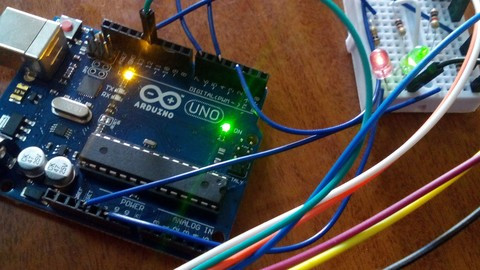Arrays are an essential part of C programming. They allow you to store multiple values in a single variable and access them using an index. One common task when working with arrays is calculating the average of all elements. This concept helps beginners practice loops, arithmetic operations, and working with arrays effectively. In this tutorial, we will write a complete C program to find the average of elements in an array, explaining each step in detail.

with hands-on learning.
get the skills and confidence to land your next move.
Finding the average of an array is a practical exercise because it combines reading input, performing calculations, and displaying results. By learning this program, you will also understand how to sum multiple numbers stored in an array, how to divide the sum correctly, and how to store and process numerical data efficiently in C.
Understanding the Problem
To calculate the average of numbers in an array, we first need to find the total sum of all elements. This requires a variable to store the sum, which we start at zero. As we go through each element, we add it to this sum variable.
Once all elements are added, we divide the total sum by the number of elements to get the average. Using a float or double variable ensures that the result can include decimal points, giving a more precise average.
This simple approach demonstrates how loops, arithmetic operations, and variables work together in C. It also lays the foundation for using functions or recursion to achieve the same result in a more modular or elegant way.
Method 1: Using a Loop
This method adds each element of the array to a total sum as we read them, and then divides the sum by the number of elements to find the average. It is straightforward and easy to understand for beginners.
#include <stdio.h>
int main() {
int n, i; // n stores number of elements, i is the loop counter
float sum = 0, average; // sum stores total of elements, average stores the result
// Ask the user how many numbers they want to enter
printf("Enter the number of elements in the array: ");
scanf("%d", &n);
int arr[n]; // Declare an array of size n to store the elements
// Prompt the user to enter the elements
printf("Enter %d elements: ", n);
for(i = 0; i < n; i++) {
scanf("%d", &arr[i]); // Read each element from the user
}
// Calculate the sum of all elements
for(i = 0; i < n; i++) {
sum += arr[i]; // Add current element to sum
}
average = sum / n; // Compute the average
// Display the result
printf("The average of the elements in the array is: %.2f\n", average);
return 0;
}In this method, the program first asks the user for the number of elements. It then reads each element and adds it to the sum. Finally, it divides the total sum by the number of elements to calculate the average. Using a float variable ensures that decimal values are preserved.
Method 2: Using a Function
We can also calculate the sum in a separate function. This makes the program modular and easier to read. The main function handles input and then uses the sum returned by the function to calculate the average.
#include <stdio.h>
// Function to calculate the sum of all elements in the array
float arraySum(int arr[], int n) {
float sum = 0; // Initialize sum to 0
// Loop through each element of the array and add it to sum
for(int i = 0; i < n; i++) {
sum += arr[i];
}
return sum; // Return the total sum
}
int main() {
int n; // Variable to store number of elements
// Ask the user for the number of elements
printf("Enter the number of elements in the array: ");
scanf("%d", &n);
int arr[n]; // Declare an array of size n
// Prompt the user to enter the elements
printf("Enter %d elements: ", n);
for(int i = 0; i < n; i++) {
scanf("%d", &arr[i]); // Read each element
}
// Call the function to calculate the sum
float sum = arraySum(arr, n);
// Calculate the average
float average = sum / n;
// Display the average
printf("The average of the elements in the array is: %.2f\n", average);
return 0;
}In this approach, the function arraySum loops through the array to calculate the sum. The main program simply reads the input and calls the function. After getting the sum, it divides by the number of elements to find the average. This method makes the code cleaner and easier to maintain.
Method 3: Using Recursion
Recursion provides another way to calculate the sum before finding the average. The sum of the array is calculated by adding the last element to the sum of the remaining elements.
#include <stdio.h>
// Recursive function to calculate the sum of an array
float sumRecursive(int arr[], int n) {
if(n == 0) {
return 0; // Base case: if array size is 0, sum is 0
}
// Add the last element to the sum of the rest of the array
return arr[n - 1] + sumRecursive(arr, n - 1);
}
int main() {
int n; // Number of elements in the array
// Ask the user for the number of elements
printf("Enter the number of elements in the array: ");
scanf("%d", &n);
int arr[n]; // Declare the array
// Read elements from the user
printf("Enter %d elements: ", n);
for(int i = 0; i < n; i++) {
scanf("%d", &arr[i]);
}
// Call the recursive function to calculate the sum
float sum = sumRecursive(arr, n);
// Calculate the average
float average = sum / n;
// Display the average
printf("The average of the elements in the array is: %.2f\n", average);
return 0;
}With recursion, the program keeps calling the function with a smaller portion of the array until it reaches the base case of zero elements. Each recursive call adds the current element to the total sum. After calculating the sum, the average is found by dividing by the number of elements. This method is elegant and helps understand the concept of recursion.
All three methods produce the same result. The first method is simple and fast, the second makes the code more modular and reusable, and the third is useful for learning recursion. Beginners can start with the loop, then try using a function, and finally explore recursion to see different ways to solve the same problem.
Common Beginner Mistakes
When calculating the average of numbers, beginners often make these mistakes:
- Using an
intvariable for the average, which truncates decimal values and produces inaccurate results. - Forgetting to divide the sum by the correct number of elements or misusing the loop counter.
- Not initializing the
sumvariable to0, which can result in unexpected or incorrect outcomes.
To avoid these issues, always use a float or double for the average, divide by the correct element count, and initialize accumulator variables before use.
FAQs
Q1: Can this program handle negative numbers?
Yes, the program works with both positive and negative numbers. The sum and average calculation are valid for any integers.
Q2: Why do we use float for sum and average?
Using float allows the average to include decimal points. If we use int, the average will be truncated, losing precision.
Q3: Can this program be modified for double arrays?
Yes, you can use double instead of float for higher precision, especially when working with very large or very precise numbers.
Q4: What if the array is empty?
If there are no elements, dividing by zero will cause an error. Always ensure that n is greater than zero before calculating the average.
Conclusion
Calculating the average of elements in an array is a foundational C programming exercise. It helps you practice working with arrays, loops, and arithmetic operations. By understanding this program, you gain skills that can be applied to other tasks, such as computing sums, finding minimum or maximum values, or analyzing datasets. Keep practicing with different arrays and numbers to strengthen your understanding.
References & Additional Resources
- Kernighan, Brian W., and Dennis M. Ritchie. The C Programming Language. 2nd Edition, Prentice Hall, 1988.
- GeeksforGeeks: Average of Array Elements – Detailed explanation with examples.
- TutorialsPoint: C Arrays – Guide to using arrays in C.
- Programiz: C Programming Examples – Beginner-friendly C programs collection.
- Stack Overflow: Average of Numbers in an Array – Discussion on array average calculation techniques.







